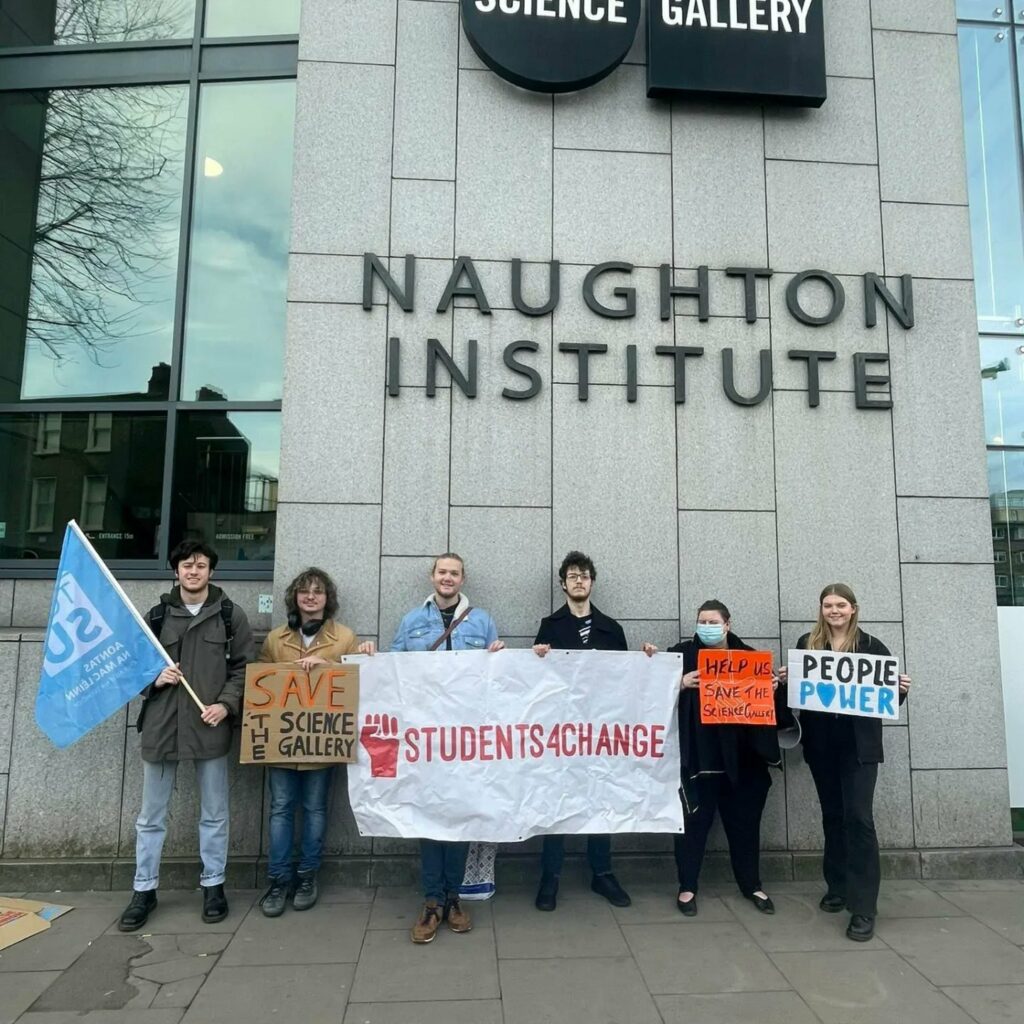
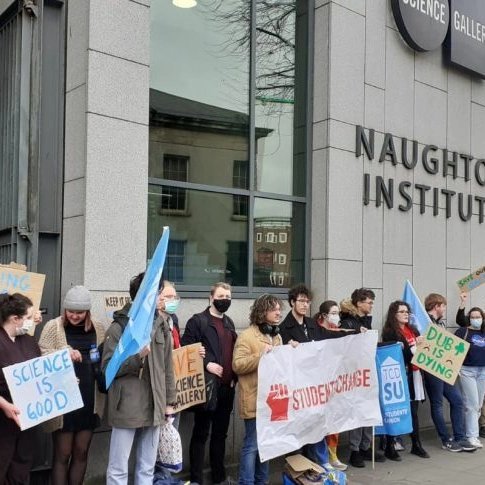
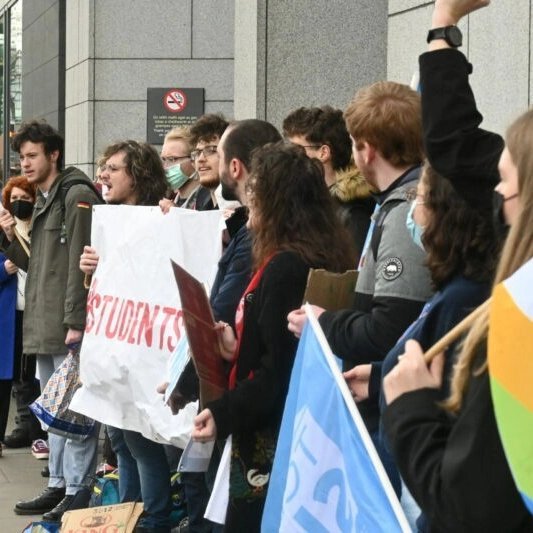
Credits for pictures here.
Leftist students for social progress.
According to a memo from the Martine Smith, Dean of Graduate Studies on the 20th of September a working group of the Graduate Studies’ Committee comprised of students, staff and management decided that the guidelines of lecture recording of 2020-2021 (that all lectures should be recorded) should remain in place for 2021-2022 “given the uncertainty about the public health environment and the extent to which reliance on remote teaching and learning might persist”. This policy should “remain in effect where possible – i.e., lectures should be recorded and made available through the VLE where possible and practicable, for the remainder of the academic year.”
Since September 2021, many students indicated the lack of access to remote learning and the changing attitudes of College, as described in the results of our inclusivity survey. Recently, the College seems to have backtracked on its promise completely.

The fact that a working group comprised of all stakeholders approved a certain set of guidelines which then seem to have been removed by the Provosts’ Office by a snap of a finger indicates deep-seated issues with governance. It is absolutely undemocratic and inconsequential to act in such a way. There was also no proper communication around the issue.
We demand an immediate re-instation of hybrid learning – recording of lectures – since the pandemic is not over for many people, such as those who are immuncompromised or cannot get the vaccine for medical reasons.
We are releasing the memo from the Graduate Studies’ Committee below. This memo was presented at the COLSAG meeting on the 21st of September 2021 .



19th of January 2022
Dear undergraduates and postgraduates,
#StopHEABill22
The Department of Further and Higher Education, Research, Innovation and Science has published a new bill detailing amendments to the Higher Education Authority Act, 1971 in January 2021[1]. The GSU and Students4Change are extremely concerned with the contents of this bill and what it entails for the future of third-level education in Ireland. The HEA Bill 2022 aims to alter the relationship between the state and third-level educational institutions. It amounts essentially to a government takeover of academia, and will result in a loss of student representation during a time when the country is in a difficult financial situation and in the midst of a mental health crisis.
One of the more prominent tenets of the bill is more state control over third level education. One of the specific proposals would result in a reduction in the number of TCDSU representatives on Trinity College Board, both in actual numbers and proportional to the size of the board. Currently both Students’ Union and Graduate Students’ Union presidents and the SU Education Officer and SU Welfare Officer sit on the Trinity College Dublin Board. The bill would lead to a reduction to 2 student representatives down from 4, with the loss of the Education Officer and Welfare Officer of the SU on the Board. This is a change both the SU and the GSU are set to oppose[2].
Additionally, the proposals in the bill constitute a significant overreach of the Government in the administration of third-level education. Changes will enable the government to intervene in our institutions and further push their neoliberal agenda, resulting in even-more corporatization. The bill essentially amounts to state ownership of academia.
If the bill becomes law, colleges will have to adhere to designated “frameworks” in order to secure their funding, and the composition of their decision-making bodies will have more state-appointed members.[3]
The punishment for Universities not following the instructions of the government is dire. Some of them involve withholding of funding, some of them involve giving instructions to the higher education institution which if they do not follow they will lose funding. It is very hard to see how any real realistic autonomy will be maintained if the bill passes. Already dependent on the state for scant funding, universities will further be tied to the government.
There is an appeals Board but it is not independent, as the minister appoints it. There is as such no sign that an appeals Board would act independently of the minister.
Furthermore, the powers of Universities to appeal certain measures which are taken against them is relatively limited as to what can be appealed. Furthermore, it seems that the fact that an appeal has been taken does not operate as a stay on what it has been instructed to do. A university may have to proceed to do what it is being told to do even when it is appealing the decision which was the basis for it being told to do it.
In addition, the HEA Bill will give extended powers to the Chief Executive Officers of the HEA as opposed to the Board of Colleges. Specifically, they and not the Board may co-decide the conditions that go along with funding and may seek information from the government in relation to compliance with those conditions. They may also order a review from the Board or appoint an external review to make sure those conditions are being followed.
At the Board meeting of Trinity College Dublin held on the 19th of January 2022 it was discussed what is to be expected from the government’s new HEA bill relating to changes in College governance. The student representation in attendance are extremely concerned of the loss of autonomy and the loss of the student voice proposed in the bill.
The College’s Statues and Schedule Working Group will have to rewrite the the College Statutes[4], which is an affront to the autonomy of third-level educational institutions, so as to make it match with the bill’s requirements. Most Colleges will have to have a 17-member governing body, as follows.
3 of the 8 external members will be appointed by Minister Harris’ Office and the other 5 by the governing body itself.
Our College, however, will be the only university permitted to retain a majority of internal board members due to the “distinct role played by Fellows within the Trinity community”, according to the Department of Further and Higher Education. To accommodate this, Trinity may have up to 22 members on its governing body while other universities will have a maximum of 17[6]. This is, however, not enough to stop the loss of student representation, both absolute (2 less) and proportional (2/22 is 9% which is less than 4/27 which is 15%).
The College has proposed that in order to mitigate the diluting effects of student representation, the Welfare and Education Officers would be retained as observers. The College has further said it will want to put former student union sabbatical officers as 2 external representatives of the 5 governing-body-appointed representatives.
All of these proposals are unacceptable. It will dilute the student voice during a pandemic and its aftershock and a financially turbulent time for many of us , not to mention will dilute one of the most important student representatives, the Welfare Officer. The Welfare Officer is on-the-ground dealing with casework and needs to be represented on Board. A student can never have enough representation. Furthermore, hand-picked former student union sabbatical officers are no substitute for student representatives who are actually there and know the issues of the student body, not to mention that hand-picking by College’s senior management will lead to those getting appointed to Board who are not keen on upsetting the apple cart.
Furthermore, government funding of our College amounts to 39% and students contribute around 42%[7] of the College’s annual budget. Even from a consumerist perspective, it is not justified that more external members will come on the Board when we have student representatives who can ensure “value for money” in financial terms. No matter which way one looks at it, this Bill must be resisted by everyone in our community.
“It is the failure of successive Irish governments to fund adequately the third-level sector (and to eschew its own accountability for this) which has led, quite logically, to the imposition of the Bill. In this regard the passivity of university presidents and their failure to challenge the move robustly is nothing short of breath-taking. The argument that we must “tow the line” as more funding will otherwise be cut is naive, lacking in courage and strategy, and a grave dereliction of duty.”
– Professor Sarah Alyn-Stacey, Trinity College Dublin.
“The proposed legislation on university governance will shrink, not only the size of governing authorities, but will also serve to muzzle the voices of academic and administrative staff. As outlined, membership will be weighted in favour of external (including ministerially appointed) members. Far from guaranteeing more robust governance, the more likely outcome will be a further constraining of critical voices.”
– Professor Eoin Devereux, University of Limerick.
The state is asserting itself and Colleges are agreeing with its par to decide on university matters, such as the composition of the Board.
Students4Change and the GSU calls on Trinity College Dublin to immediately and publicly voice its opposition to the new HEA Bill. If the College does not call upon the government to prevent the passing of this bill, with its full strength thrown behind its opposition, then the GSU will refuse to sign the upcoming Student Partnership Agreement (SPA). The SPA is essentially a document describing College’s commitment and respect of the student voice through cooperation. We call upon the TCDSU to follow in our footsteps and refuse to sign the Student Partnership Agreement (SPA) until College comes out in complete opposition to the new bill. In addition, we will also be challenging the bill in the Oireachtas by making a submission to the relevant committee, and would welcome your contributions.
Colleges’ governance disregards students and staff, and has for a long time, not to mention how increasingly corporatized it has become. However, the answer isn’t government intervention, it is massive student-staff pressure from below. We need to resist the encroachment of academia with our full might. There comes a time when strongly-worded letters are not enough; when circumstances call us to action, and when nothing must be off the table – strikes, marches and occupations to make our will known.
We call upon the College, the Board, students, Visitors, Fellows and Scholars; staff and workers; trade- and student unions; societies; political groups on-campus and outside to oppose the government takeover of academia and the weakening of democracy with the utmost urgency.
Gisèle Scanlon, President, Graduate Students’ Union +353864120444
László Molnárfi, Chairperson, Students4Change +32 470583174
https://universitytimes.ie/2022/01/governance-bill-details-new-conditions-attached-to-state-funding/ ↑
https://universitytimes.ie/2022/01/tcdsu-gsu-to-lobby-to-retain-four-student-representatives-on-board/ ↑
https://universitytimes.ie/2022/01/tcdsu-gsu-to-lobby-to-retain-four-student-representatives-on-board/ ↑
https://www.tcd.ie/registrar/statutes/ ↑
https://www.gov.ie/en/publication/0da13-higher-education-authority-bill-your-questions-answered/ ↑
https://universitytimes.ie/2022/01/governance-bill-details-new-conditions-attached-to-state-funding/ ↑
https://www.tcd.ie/financial-services/external-assets/pdfs/Consol_Financial_Statements_1920.pdf ↑
An FOI request put forward by László Molnárfi, Chairperson of Students4Change and Gisèle Scanlon, President of the Graduate Students’ Union, on behalf of the #NoInPersonExams national campaign to Minister Harris’ Office has now been granted. The reason for the FOI request was to ascertain a timeline in which Minister Harris engaged with the 5,000 student and staff signatures of the open letter so that he can make a balanced and fair decision relating to in-person examinations. The #NoInPersonExams open letter is spearheaded by two Trinity students, undergraduate László Molnárfi and postgraduate Giséle Scanlon, and has amassed over 5,000 signatures, which were delivered to Minister Harris in good faith on the 1st of December 2021.
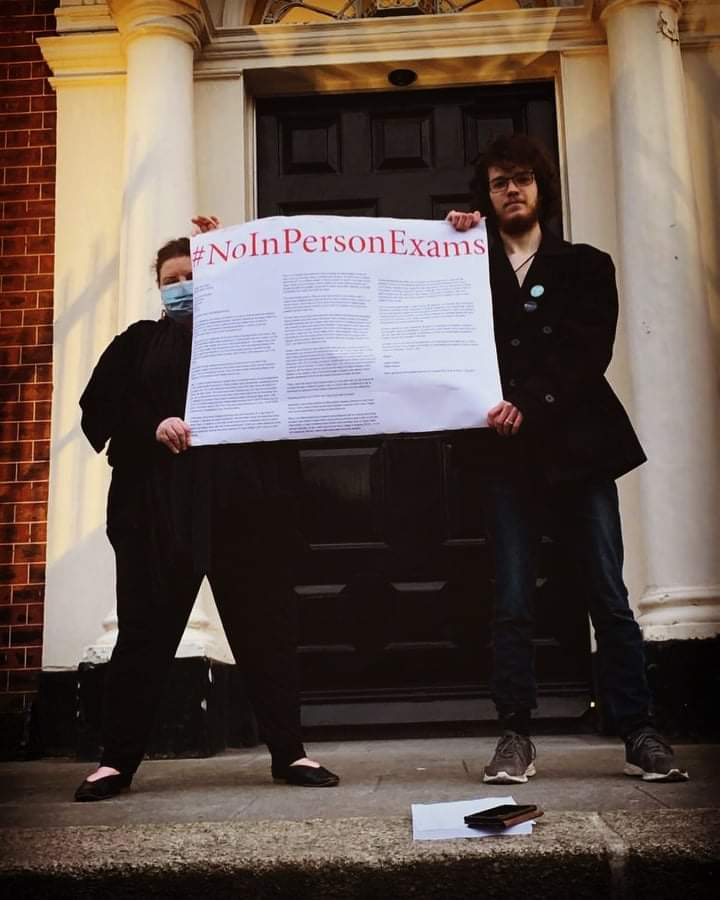
Today we have received the results of this FOI. The correspondance which we received contains 6 records were granted to us after we asked for “Documents, communications regarding the decision of Minister Harris to not intervene in Universities holding in-person exams for Semester 1 of 2021-2022. Any communication between Minister Harris and Donnelly for this issue including the meeting minutes of the meetings that Minister Harris had with
management, staff and student representatives. E.g. the one on December 1st
2021 with the student unions” and “Documents, communications regarding Minister Harris’ and the Department of Further Education “s consideration of the #NoInPersonExams open letter, which was delivered to the Minister’s Office on 52 Stephens Green on the 1st of December 2021”.
As early as November 19th 2021 at a meeting of the Covid-19 TES Steering Group the issue of Semester 1 examinations across Universities and Technological Universities was discussed. Minister Harris said in his opening remarks that “Decisions in relation to examinations should be taken in accordance with the framework in place i.e. on the basis of risk assessment and consultation”, according to meeting minutes.

At the same meeting, the Union of Students Ireland (USI) President Claire Austick raised the issue of having alternative options for students not able to attend in-person examinations, according to meeting minutes of the Covid-19 TES Steering Group.

Dr Joseph Ryan from THEA, the Technological Higher Education Association, brought concerns relating to increasing levels of anxiety surrounding examinations.
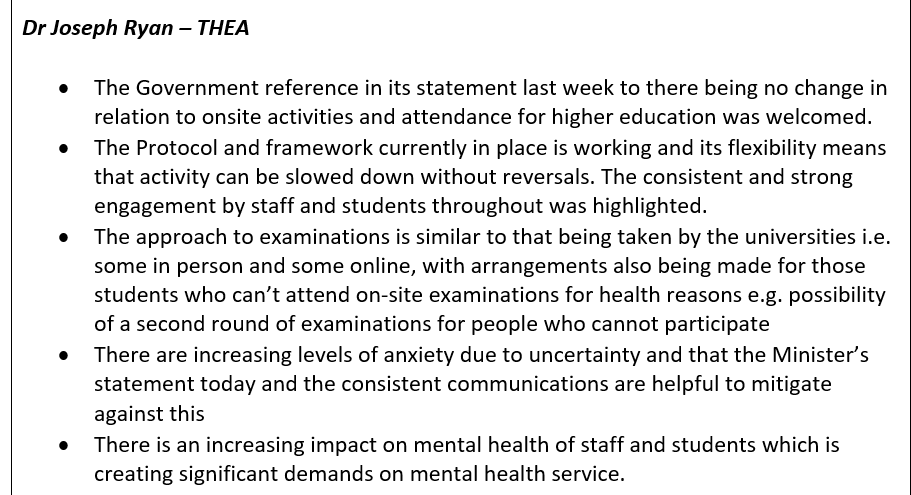
The IUA’s representative at the meeting stated the importance of alternative examination arrangements and also access to PCR tests. The IUA is short for the Irish Universities Association and they represent DCU, Maynooth Uni, NUI Galway, TCD, TU Dublin, UCC, UCD and the University of Limerick. The IUA is composed of the Presidents of each of these Colleges.
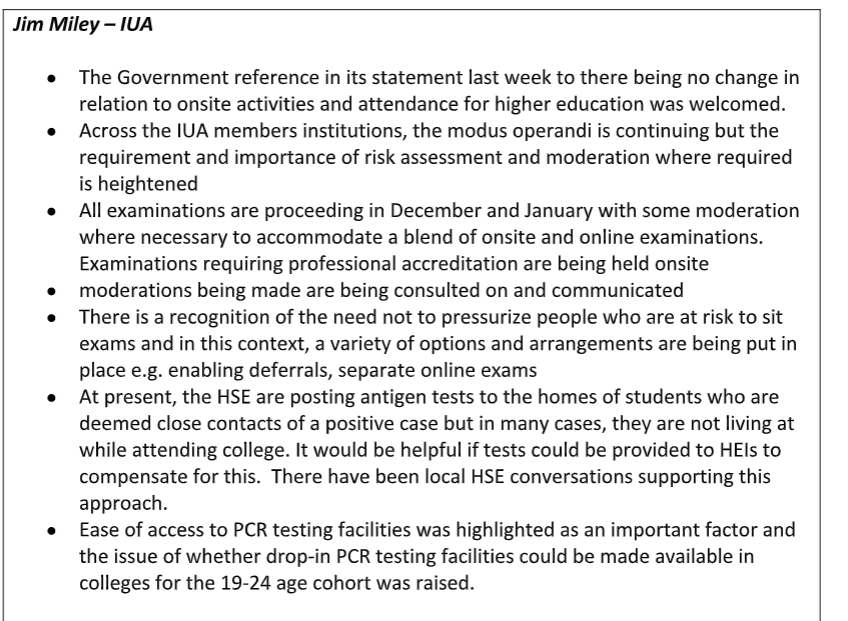
Just a month later, at the next meeting of the Steering Committee on the 10th of December 2021, in the middle of exams, Minister Harris in his opening remarks is seen to call the student voices, like NUIGSU, who called out instititutions not creating safe exam conditions to be lies. He called upon stakeholders to “debunk misinformation regarding the application of public health advice”. He also said that an agreement was reached that a “one size fits all approach is not appropriate” – this agreement must be referring to the government’s own decision, as meeting minute do not indicate any sort of direct discussion on the topic.
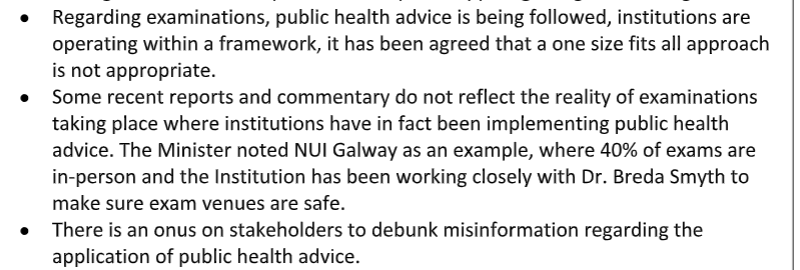
Dr Breda Smyth, is the director of public health for the Health Service Executive in the west, and also is one of the leaders of the Unicov project.
Claure Austick, USI President, after the opening remarks of Minister Harris, reiterated the importance of alternative options for assesment students in light of rising Covid-19 cases.
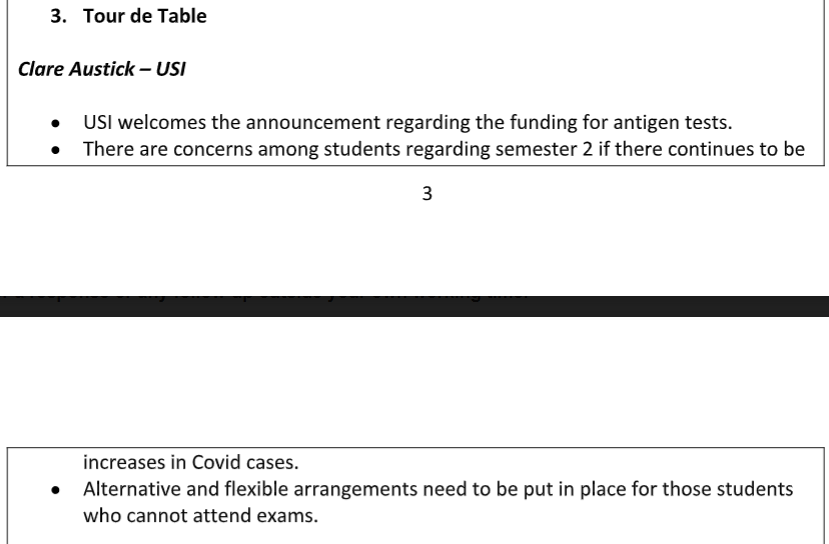
The IUA suddenly at this meeting agreed with Minister Harris, contradicting students’ and staff’s account on a number of issues, namely the amount of in-person exams, whether these exams are safe and whether there are proper alternative arrangements (e.g. deferral mechanisms) in place. They also claim that whenever an exam was postponed due to Storm Bara, it was moved to a different date “in agreement with local student unions”, but this was clearly not the case for NUI Galway’s Saturday exams.
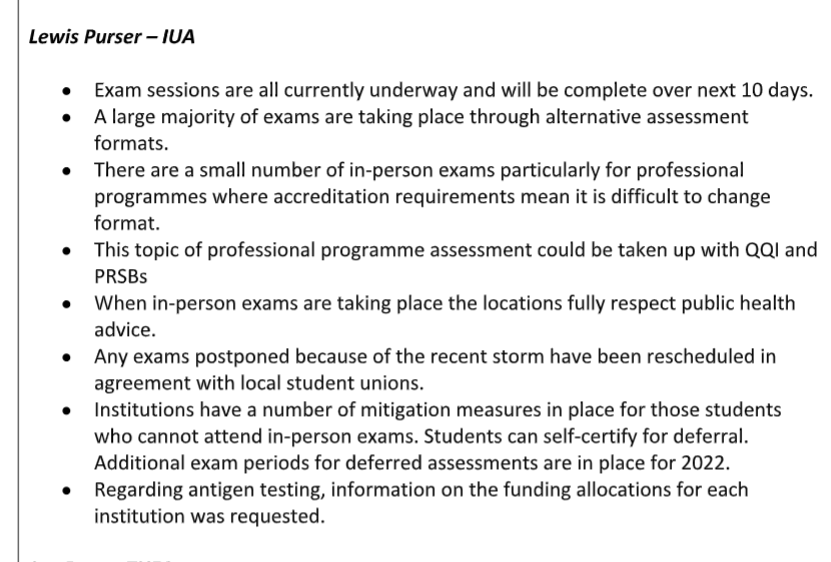
Stella Griffin from FORSA, an Irish trade union, noted concern for invigilators (since they are older and more at-risk) in exam halls at the meeting.
It does not seem that at these meetings Minister Harris allowed much discussion, either at the November meeting, or at the December one, despite claiming to do so. His Office had already made up their minds before hearing any of the other stakeholders, and the government seems to not have listened to student and staff concerns. It seems that at the November meeting, promises and suggestions were made by a variety of stakeholders that were never implemented by the government. Proper deferral was not implemented across many universities – 86% said they felt pressured into not deferring according to a recent survey, and PCR testing at the time of the Christmas exams was very difficult to access. Eyewitness reports, pictures and videos detail crowded scenes in examination halls. It seems that those in-charge have no clue what is going on on-the-ground.
Following the 10th of December meeting, a document which describes how to answer questions from TDs in the Dail relating to in-person exams was disseminated to government members. It said that the key messaging must be that all stakeholders were consulted. Furthermore, it crafted a reply to possible “opposition attack lines”.
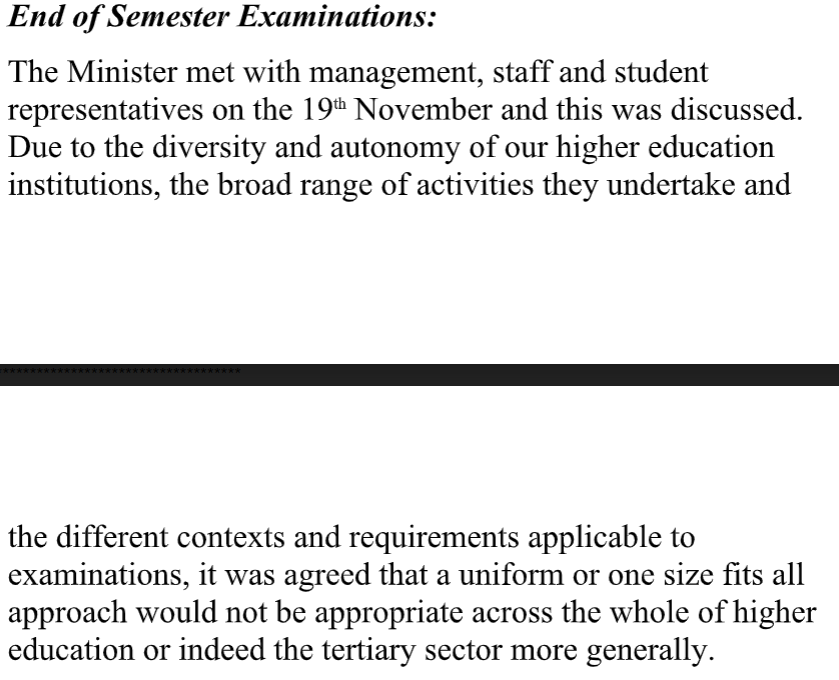
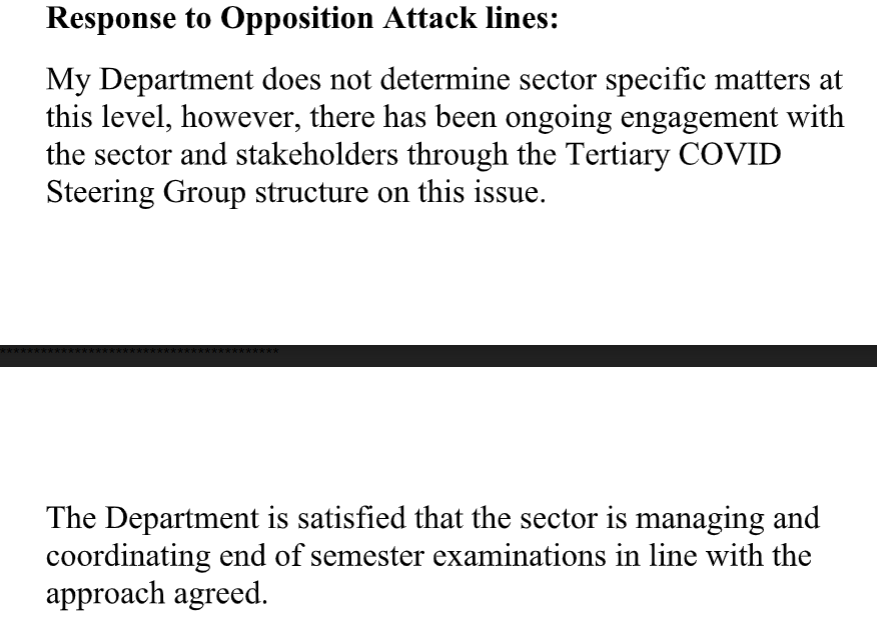
Another meeting was held just between Minister Harris and the USI and different SUs on the 1st of December 2021. The briefing document prepared for Minister Harris for this meeting shows that Minister Harris’ Office essentially let Universities take the blame. This was re-iterated to the representatives at the meeting, who raised the issue of #NoInPersonExams.
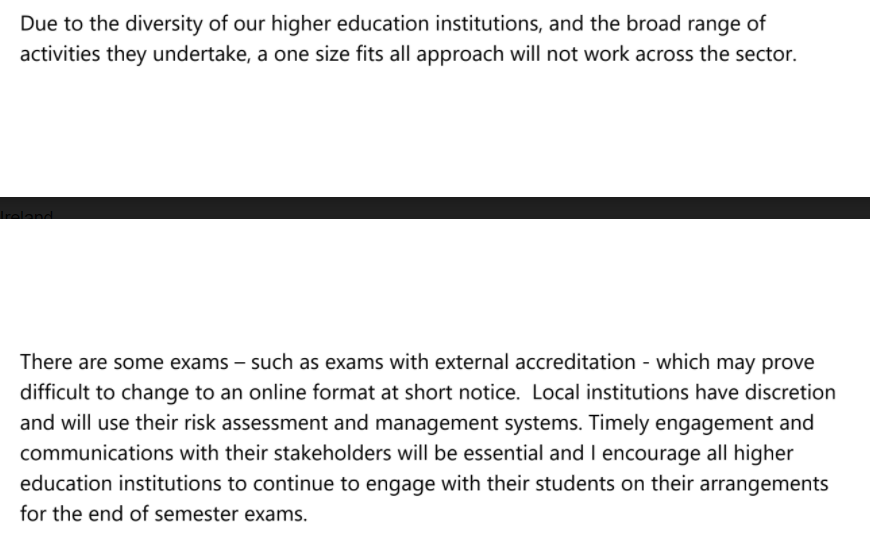

As far as whether the Minister’s Office considered the #NoInPersonExams open letter with 5,000 signatures, they did not. They put it in the government system, but there is no indication that Minister Harris or others in the government took the time to engage with the signatories. This shows a huge disrespect for the 5,000 students and staff who raised the mental and physical dangers of in-person examinations and is an affront to the democratic process.
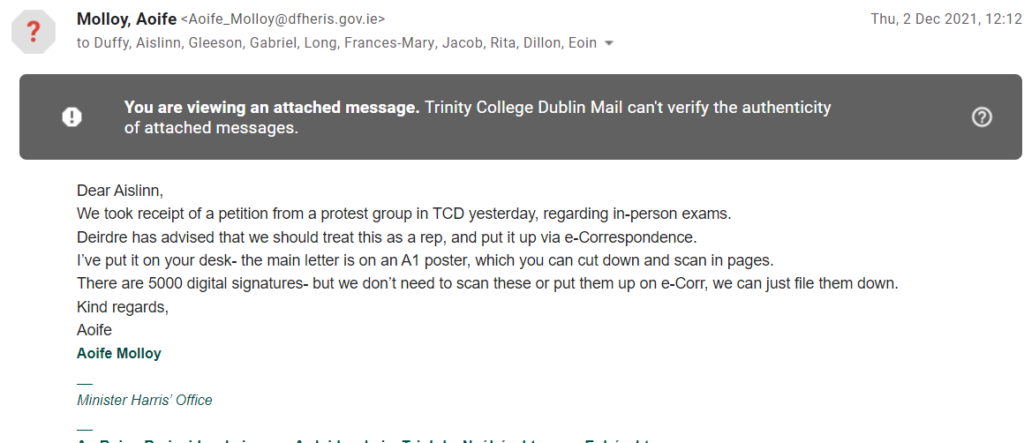
This was the only communication and document relating to the FOI about whether the government considered the #NoInPersonExams open letter. Branding the Graduate Students’ Union of Trinity a “protest group” just shows how out-of-touch Minister Harris’ Office is with student representation on-the-ground.
Find all the original FOI documents here. Note that for the briefing document mentioned just a moment ago, there were supposed to be “redacted” parts, but the government failed to redact it properly – you can simply copy-paste from the PDF, so we made an unredacted version which describes different issues relating to third-level education at the moment.
We would hope that the Minister has learnt lessons from this, namely that the next time we call to deliver a petition with several thousands signatures and hundreds of thousands of social media interactions, that the Minister will have the good grace to engage with not only the content of the petition, but should extend appropriate respect to the many thousand voters who took the time and consideration to be a part of the campaign.
We are publishing the worrying results of our #NoInPersonExams survey, in which students from across the country participated. 86% said they felt pressured into not deferring. 57% said that they were financially affected, and 65% had to travel with public transport for their exams. 75% lived with someone at-risk, and 85%/98% said that there was no adequate social distancing in the exam hall / in the outside line. 71% of students have heard of others going into the exam hall despite being positive, and 57% of students have heard of others becoming positive following an exam. Find the general and per-University results in full at this link, including comments from students.
At Students4Change we aim to empower you with the tools to make change and effective activism. An FOI request allows you to request any data from any public body, even data considered confidential. It is free and legal right enshrined in the 2014 FOI Act.
It is a very powerful tool as it allows you to gather data. For example, most students would feel that a refund for last year is a fair demand, as online College was disengaging and it made no sense to pay so much money for it.
However, to prove this, statistics are needed. For example, from the big SUrvey from last year we know that 71.4% did not feel part of the College community in 2020-2021 due to online learning, which suggests that the student experience was greatly reduced. From an FOI request, we also know that the total number of students (both undergraduate and postgraduate) who withdrew in the academic year 2020/21 during the pandemic was 1,231 (higher than previous years) December 2020, further supporting this argument. This can then be packaged into e.g. a report or a press release which supports refunds.
Some other examples of FOIs requests that we have done:
To make an FOI request for Trinity College Dublin, you have to fill out a PDF form, which you can do online, and then you have to send on this form to the email address [email protected] .
Here is a link to the FOI request PDF form, and here is a link to an online PDF editor called Smallpdf. When making our FOI request for Trinity’s investments, for example, this is how we filled it out.
It is a similar process in other Universities, like for University College Dublin. There the email is [email protected] and the form can be found here.
The same investment FOI as a filled-out example can be downloaded here.
Here is a PDF of all FOI contacts for third-level institutions in Ireland.
Some tips:
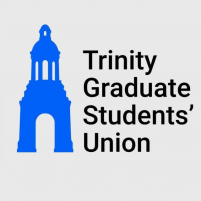

7th January 2022
Dear undergraduates and postgraduates
We are writing to highlight an urgent issue that has come to the attention of the GSU Executive, Students4Change and the Chair of the GSU Board.
It has come to our attention that the Schols Examinations will proceed on Monday January 10th, 2022 with formal communication being issued as late as late last night Thursday 6th to students this week in relation to these exams. This lack of communication and engagement with the Schols secretary, Schols applicants and indeed student representatives raises deep concerns. We have included here links to all known information contained on the Schols pages of Trinity College Dublin.
In a GSU Executive meeting held yesterday, several issues were discussed around Schols and the following concerns were raised:
[a] Infrastructure (affording a computer or internet at home) is stressful.
[b] Living conditions (shared rooms where students can take their exams
without being disturbed and can concentrate. Students might live in
accommodations that are loud because of many reasons from nearby
constructions or motorway to crowded apartments).
[c] Students with caring duties might find it difficult to find someone to take care of their children while they are sitting an exam or making clear that they
are under no circumstance be disturbed which induces anxiety.
The use of online proctoring software such as Proctorio violates student privacy and creates unnecessary barriers to exam-taking. It should not be used in Trinity College Dublin.
The GSU and S4C expresses concern in relation to the upcoming Schols examinations and presents a number of recommendations. The health and safety of undergraduate students and postgraduate invigilators must be of the utmost importance and we hope that College will listen to our concerns and asks to ensure the wellbeing of our Community.
Gisèle Scanlon, President, Graduate Students’ Union +353864120444
László Molnárfi, Chairperson, Students4Change +32 470583174
This is not a statement yet, just a few bits of data.
When surveyed, candidate Scholars did not agree on an exclusively-online or exclusively in-person system as of 06/01/2022 17:17. From a sample of 53, no majority is for either online or in-person. 18.9% are for in-person and 28.3% are for online, the rest 52.8% for postponement. However, many students, upon seeing that there was no hybrid option in the form, have indicated to Students4Change that they are in favour of a hybrid system, as that is the most fair, and stressed the importance of mechanisms which ensure academic integrity.
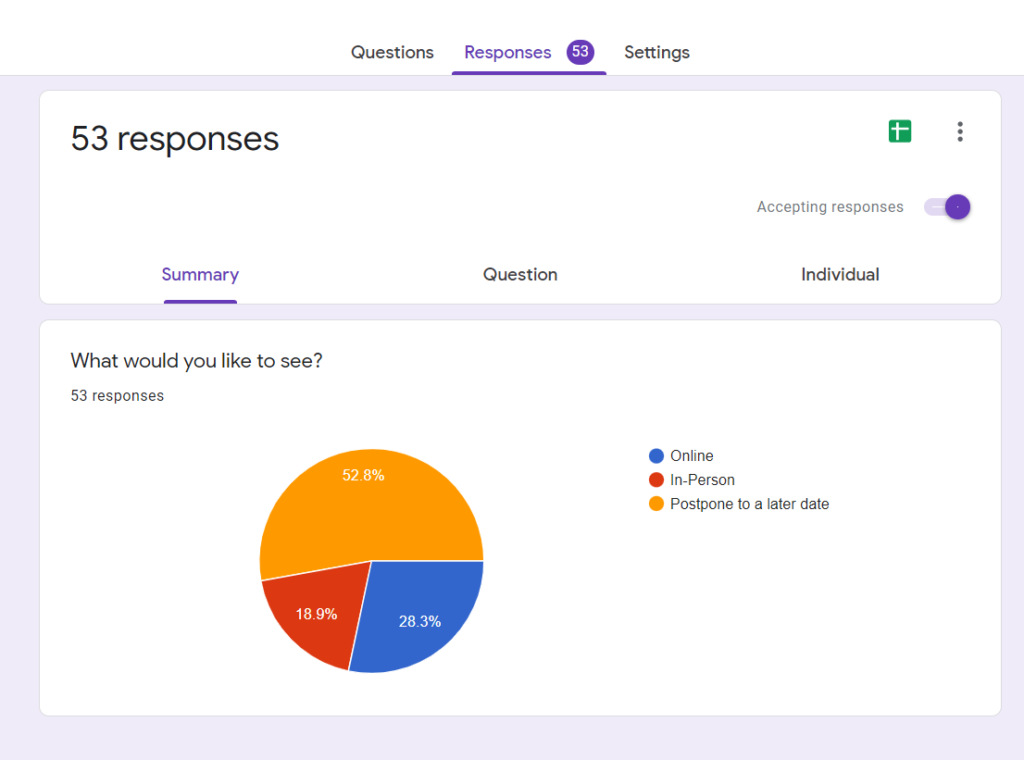
A few comments from students as follows.
“I think another option might be to offer online exams to those who have covid but who are still well enough to sit the exam, just so that they don’t have to wait until next year to get a chance at schols. It would prevent anyone from going into the exam hall knowing they have covid too”
“Offering a deferral for next year really isn’t a fair alternative”
“People studying for schols have been working under the assumption that it’s in person this whole time, so a complete change of plans might do more harm, but people also shouldn’t have to wait a year to retake for something they can’t control”
© 2025 Students4Change
Theme by Anders Noren — Up ↑